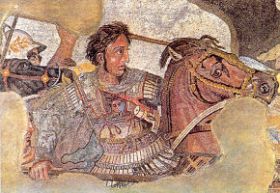52 - Fighting Over Socrates: the Hellenistic Schools
Posted on
Peter introduces the Hellenistic philosophical schools – the Cynics, Epicureans, Stoics, and Skeptics – and asks how they responded to earlier thinkers.
Themes:
Further Reading
• A.A. Long, “Socrates in Hellenistic Philosophy,” Classical Quarterly 38 (1988).
• A.A. Long, “The Socratic Legacy,” in K. Algra et al (eds), The Cambridge History of Hellenistic Philosophy (Cambridge: 1999), 617-41.
• P. Merlan, “Minor Socratics,” Journal of the History of Philosophy 10 (1972), 143-52.
• P.A. Vander Waerdt, The Socratic Movement (Ithaca: Cornell University Press, 1994).






Comments
Some forgotten schools of philosophy
Will you be saying something about Cyrenaic or Megarian schools in the future?
In reply to Some forgotten schools of philosophy by Anonymous
Cyrenaics and Megarians
Indeed I will - "without any gaps." In fact episode 54 is devoted entirely to the Cyrenaics (I just listened to the edited version, and it will go online on Nov 13). The Megarians/Dialectical school won't get an episode to themselves but they come into the episode on Stoic logic, which is a couple of months off still because I'm doing the Epicureans first.
Music
Hey there Peter. Could you post the name of the song you edited into the beginning and ending of the pod casts?
Thanks!
In reply to Music by Giuliano
Music
It's the first track on this page, Stefan Hagel's "Ancient Music" site:
http://www.oeaw.ac.at/kal/agm/
By the way he kindly gave me permission for this clip and the aulos clip I used in episodes 1-51, so thanks again to him!
In reply to Music by Peter Adamson
Music
Its very nice indeed. Thank you for the info.
Works of Pierre Hadot
Hi Peter,
I have found your podcasts extremely interesting and have been following your talks on a qutie regular basis. Besides what you have suggested here, I have been reading some books on my own including those by Pierre Hadot.
My inquiry actually concerns his works. What do you think of them? I am thinking of the following books which I have read so far: What Is Ancient Philosophy?, The Inner Citadel, and Philosophy as a Way of Life. In his discussion of ancient philosophers, Hadot dwells less on an exposition of physics, logic, or epistemology as he does on ethics, politics, and psychology. In other words, he evaluates some of the same philosophers that you have been surveying here from the perspective of their ethical teachings, and he stresses that this is the best way of understanding their works. I wonder if you agree with this analysis.
On a slightly different topic, I wonder what you think of popularizers such as William B. Irvine who is himself a philosopher but who writes mostly for the general readers (rather than academics) on Stoicism. Is he to be taken seriously?
I am familiar with the various companion series (Cambridge, Blackwell, etc.) you have suggested people to take a look at. But I wonder if you can suggest a single narrative account of philosophy from ancient times to the modern period and perhaps another one for the Islamic world, which I believe you have your speciality in.
Appreciatively,
Ron
In reply to Works of Pierre Hadot by Ron
Hadot etc
Dear Ron,
Thanks, I'm glad you are enjoying the podcast. I have to admit I don't know Irvine's work but usually if something comes out with Oxford UP it is at least worth a look. Hadot is a pretty major figure though rather contentious -- without having made a lengthy study of his numerous books, I would say that there is a lot of truth in his suggestion that in the ancient world philosophy was a "way of life" and not just a technical or scholastic discipline (indeed Hadot would rightly insist that its sometimes being technical and scholastic is consistent with it being a kind of way of life or "spiritual exercise"). Of course this statement can be taken as a useful, but obvious point -- it's hard to miss in many ancient authors -- or as taking things too far, that philosophy is _only_ a kind of spiritual discipline and thus utterly unlike what we are doing in philosophy departments for the most part nowadays. I think the truth is probably somewhere in the middle. Certainly Hadot's approach has been very fruitful and influential in the field and I think it is important if only for that reason.
A single narrative account for all of philosophy: tricky, because there aren't many to choose from and of course by their nature they tend to skip a lot and be uneven. Copleston's is the main contender I guess, but in recent times there is also Anthony Kenny which is less dated. I am tempted to say that really, only a fool would try to cover the whole history of philosophy singlehandedly, but, um...
Anyway, Islamic philosophy: I am one of the editors of the Cambridge Companion to Arabic Philosophy so I guess I would steer you towards that! By single authors there are various books available, but to be honest I'm not a big fan of most of them; the best may still be M. Fakhry, A History of Islamic Philosophy (New York: 1983). I am not very enthusiastic about Leaman's various introductory histories, in all honesty; he's a good philosopher but I prefer a more historical (and maybe less judgmental) appraoch. When I get that far there will of course be further reading suggested here on the website.
Thanks,
Peter
References?
Hi Peter,
Could you please let me know which resources you referenced for this podcast?
Thanks!
In reply to References? by Zoe
References
The "further reading" for the whole Hellenistic series, and then for each episode, will give you a general idea what I read for each episode. For more details though if you get your hands on the book version (Hellenistic is in volume 2) there are footnotes and references in the main text that will let you see what I am citing in more detail.
If there was anything in particular you wanted to follow up let me know and I can check in the book for you.
In reply to References by Peter Adamson
Hi Peter,
Hi Peter,
Thanks for that! I can only seem to get my hands on the 1st volume of this book. Is there much difference between the two volumes? At the moment I'm in the process of writing a research paper exploring Hellenistic philosophy and looking into the surrounding social influences which brought about the philosophical schools of Stoicism, Epicureanism and Scepticism following Alexander the Great's death. In this paper, I was also wanting to explore the hypothetical idea that if these schools of thought were around during the time of Alexander, would the life of this great conqueror have turned out differently. There is no doubt that Alexander was successful in his life. However being caught up in this all-consuming entity of success, did Alexander truly live a happy life? What if Alexander was a Stoic? An Epicurean? Or even a sceptic? Would he have been successful? Happy? Both? Or neither? Given your expertise in this area, are there any resources you would suggest I look into with respect to these ideas for further insight?
Thanks,
Zoe :)
Add new comment